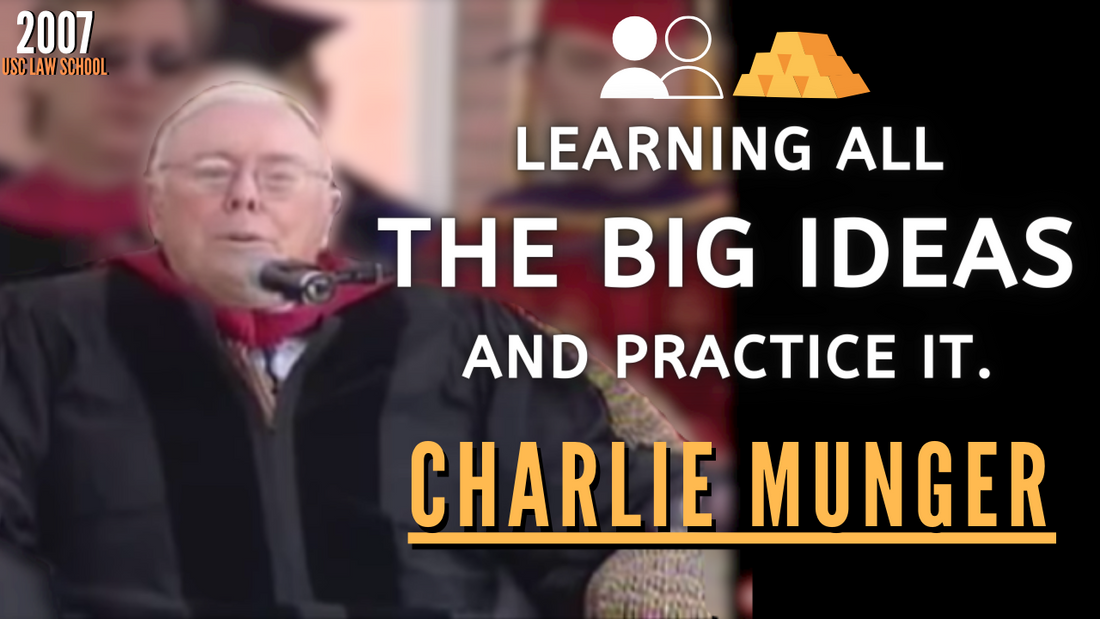
Charlie Munger: Don't be a Perfect Damn Fool. | USC 2007【C:C.M Ep.162】
[Transcript]
CHARLIE MUNGER: Another idea that was hugely useful to me was that I listened in law school when some wag said, “A legal mind is a mind that when two things are all twisted up together and interacting, it's feasible to think responsibly about one thing and not the other.”
Well, I could see from that one sentence that was perfectly ridiculous, and it pushed me further into my natural drift, which was into learning all the big ideas and all the big disciplines so I wouldn’t be a perfect damn fool who was trying to think about one aspect of something that couldn’t be removed from the totality of the situation in a constructive fashion.
And what I noted, since the really big ideas carry 95 percent of the freight, it wasn’t at all that hard for me to pick up all the big ideas and all the big disciplines and make them a standard part of my mental routines.
Once you have the ideas, of course, they are no good if you don’t practice. You don’t practice, you lose it.
So, I went through life constantly practicing this model of disciplinary approach. Well, I can’t tell you what that’s done for me. It’s made life more fun. It’s made me more constructive. It’s made me more helpful to others. It’s made me enormously rich. You name it, that attitude really helps.
Now there are dangers there, because it works so well, that if you do it, you will frequently find you are sitting in the presence of some other expert — maybe even an expert that’s superior to you, supervising you — and you will know more than he does about his own specialty, a lot more. You will see the correct answer when he’s missed it.
That is a very dangerous position to be in. You can cause enormous offense by helpfully being right in a way that causes somebody else to lose face. And I never found a perfect way to solve that problem.
I was a great poker player when I was young, but I wasn’t a good enough poker player so people failed to sense that I thought I knew more than they did about their subjects, and it gave a lot of offense. Now I’m just regarded as eccentric, but it was a difficult period to go through. And my advice to you is to learn sometimes to keep your light under a bushel.
One of my colleagues, also number one in his class in law school — a great success in life, worked for the supreme court, etc. — but he knew a lot and he tended to show it as a very young lawyer and one day the senior partner called him in and said, “Listen, Chuck, I want to explain something to you. Your duty under any circumstances is to behave in such a way that the client thinks he’s the smartest person in the world. If you have any little energy and insight available after that, use it to make your senior partner look like the smartest person in the world. And only after you’ve satisfied those two obligations do you want your light to shine at all.”
Well, that may be very good advice for rising in a large firm. It wasn’t what I did. I always obeyed the drift of my nature and if other people didn’t like it. Well, I didn’t need to be adored by everybody.
(Source: https://youtu.be/jY1eNlL6NKs)
[YAPSS Takeaway]
"A legal mind is a mind that when two things are all twisted up together and interacting, it's feasible to think responsibly about one thing and not the other.”
"Well, I could see from that one sentence that was perfectly ridiculous, and it pushed me further into my natural drift, which was into learning all the big ideas and all the big disciplines so I wouldn’t be a perfect damn fool who was trying to think about one aspect of something that couldn’t be removed from the totality of the situation in a constructive fashion." ~Charlie Munger
